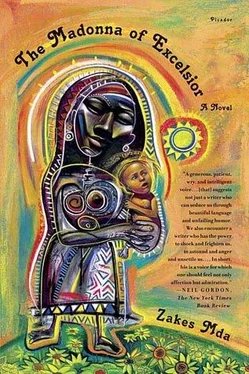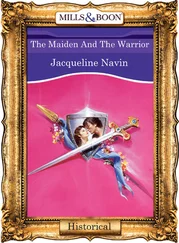“So that he will think it comes from you? No thank you, I’ll hold it.”
Popi had this bad habit of opening Viliki’s door without knocking. In this instance, she did the same. As mother and daughter entered, they were greeted by a scene that left them open-mouthed. Viliki was sitting on his new red sofa bought from Ellerine’s in Thaba Nchu on a twelve-month hire-purchase instalment plan. He was wearing khaki short pants and was both shoeless and topless. The Seller of Songs was sitting on his lap, wearing only her navy blue knickers. The couple were watching the antics of the stope-workers in the television soap opera, Isidingo .
The Seller of Songs jumped up and ran into the bedroom to hide her nakedness.
“I tell you every day, Popi, that you must knock,” said Viliki, going on the attack to hide his embarrassment.
“So this is how you get sick, Viliki?” asked Niki.
“And with this girl who makes a fool of herself playing a flute,” said Popi.
“What is Maria’s daughter doing here, Viliki?” asked Niki.
“She stays here with me, Mama. I love her.”
“You stay here with someone’s daughter without even asking for her hand from her parents? How many cattle did you pay for her?” asked Niki.
“He can’t marry a girl like this, Niki. She is a disgrace, this girl,” squealed Popi.
“Why is she a disgrace, if I may ask?” demanded Viliki.
For a moment, Popi was at a loss for words. Then she asked: “Don’t you see her?”
“I see her all right,” said Viliki firmly. “And I love her.”
“Oh, this child will be the death of me,” lamented Niki. “I come here because I heard he was sick for the whole week, only to find that he is doing a vat-en-sit with Maria’s child. I spent this whole day slaving over a three-legged pot, cooking him bean and tomato soup. What are the parents of this child saying about this?”
“Nothing,” said Viliki. “They don’t care. No one came looking for her.”
This showed how cruel Sekatle was, said Viliki. He was such a wealthy man, yet his niece had to survive by busking. Although he had built Maria a glittering mansion, he was rumoured to have said, “I am not going to toil for Maria’s mixed-breed children.” Viliki vouched for the truth of this rumour. Those words looked just like Sekatle.
Viliki’s harangue about the bane of his life was interrupted by the shattering of a window in the bedroom. All three rushed in, fearing that the Seller of Songs had done harm to herself. There she was, cowering in the corner. She had covered herself with her brown blanket. The smell of petrol filled the room. On the floor next to the bed was a bottle full of the liquid. There were pieces of glass all over the floor. Someone had thrown a petrol bomb through the window. It had failed to explode.
Viliki called the police on his cellphone.
“Who do you suspect?” asked the burly Afrikaner sergeant.
Viliki did not hesitate to put the blame on Sekatle. This was the second failed petrol bomb. The first one had been thrown into his house a few weeks ago. He had been at a braai that had been organised by the private company engaged by the council to remove the Baipehi. When he got back home, he had found a broken window and the beginnings of a fire in the living room. With the help of neighbours he had managed to extinguish it, but not before his sofa was burnt to ashes. Hence his having to buy a new one from Ellerine’s. On that day too an ineptly constructed petrol bomb had been thrown into his RDP house.
It had to be Sekatle. Earlier that week, he had led a group of boys and girls in school uniforms. They had performed the toyi-toyi dance outside his house, hurling insults at his pedigree, at Niki’s escapades with white men, and at Popi’s “colouredness”.
Viliki had chosen not to say anything about this because he did not want to upset his mother and sister. But this time Sekatle had gone too far.
27. SERENITY RESTS ON HER LIKE A HEAVY LOG
HE LOOKS quite different from the fruity accordion player of the glorious years of garden parties. He is of the new world. Nothing Flemish expressionist about him. The black outlines are thicker than ever. And rougher. Yet they fail to give him a robust look. He squeezes his purple and white accordion, and its folds breathe out the nostalgic wails of the mountain people of neighbouring Lesotho. The weight of the song has softened his face. He looks frail. The weight of the accordion has given his body a delicate demeanour. It is as if he will break into two. The weight of his purple boots has given him a painful gait. His purple overalls fly far above the ankle, almost mid-shin. His purple conical Basotho hat is tattered and has lost its crown at the pinnacle. His sharp knees pierce the white and yellow and purple light.
The Seller of Songs infected Viliki with music. He bought an old accordion at a second-hand music shop in Bloemfontein, and she taught him how to play it. She herself had never played the accordion before. She just pressed a few keys, listened to the notes each one produced, and created her own music. It took him a while to master the keys, but she was a patient teacher. Within three months Viliki could accompany the difela poetry and famo music of the mountain people of Lesotho. She accompanied his accordion with her flute, which in itself was an innovation, as that combination of instruments was unknown in the kind of Sesotho music that they played.
Every day when Viliki returned from the council meetings and wanted to relax, they played music together. And every day they sounded better than the day before. His RDP house was filled with songs, which the Seller of Songs felt were wasted, as he forbade her to go busking ever again.
“Your songs are mine alone,” said Viliki. “I do not want you to share them with other people. The music we create cannot be wasted on people who cannot appreciate its creators. who call them such names as boesman.”
“Have they ever called you that?” asked the Seller of Songs.
“Of course not,” said Viliki. “I am not a coloured person. But they have called you that. And they have called my sister that.”
“It doesn’t bother me,” said the Seller of Songs. “I can handle it. I don’t need you to defend me.”
But he continued to defend her. He defended her against Popi, who had developed a new habit of bursting into his RDP house and sniffing around as if something terrible was stinking. She would sniff close to the Seller of Songs and then, without uttering a word, she would walk out. Back to Niki’s shack.
“Why does Popi hate me so?” the Seller of Songs once asked.
“Don’t worry, she will get used to the idea that we are together now,” Viliki assured her. “She will accept you just as my mother has finally accepted you.”
“Popi. I think she hates me because I remind her of who she really is,” observed the Seller of Songs.
Viliki gave an embarrassed chuckle.
“You should teach her that I didn’t make myself to be like this,” added the Seller of Songs. “In the same way she didn’t make herself to be a boesman either.”
Suddenly Viliki saw himself as a little boy. Knocking at Stephanus Cronje’s window. He saw Stephanus Cronje reading his mother’s note, putting money in an envelope and giving it to him. He saw himself running like the wind to Mahlatswetsa Location and giving the envelope to Niki. He saw himself that evening eating assorted biscuits with Fanta Orange. And then playing with the brand-new top and brand-new marbles that Niki could now afford to buy.
“Popi could never talk about such issues,” observed Viliki. “You are wise. Your songs have made you such a beautiful soul.”
Читать дальше












